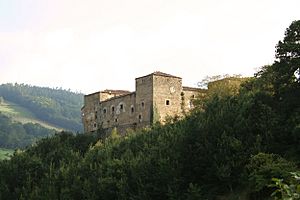Palace of Cienfuegos de Peñalba facts for kids
The Palace of Cienfuegos de Peñalba is a historic building in Asturias, Spain. It sits on a hill close to Pola de Allande, a town in the Allande Municipality. This amazing palace was first built in the 15th century. It stands where an old fort used to be. Over time, it has been updated many times. Now, only the lowest parts still show its original Gothic style.
Contents
A Look at the Palace's History
Who Owned the Palace?
The first owners of the palace were from the Ponce family. Later, it was owned by the Counts de Luna. In 1515, the Cienfuegos family took over the palace. Around 1520, Rodrigo González de Cienfuegos, who was the lord of Allande, started big renovation projects. He wanted to rebuild and improve the property.
Changes Over the Centuries
In the 1700s, the palace became the home of the Count of Peñalba. He made many changes to the building. The Count updated the palace to fit his own style and needs. These changes helped shape the palace we see today.
Exploring the Palace's Design
What Does the Palace Look Like?
The Palace of Cienfuegos de Peñalba has an L-shaped design. It features three strong towers. These towers do not have pointed tops like some castles. This makes the building look very solid and well-protected. It gives the palace a powerful and monumental appearance.
The Towers and Rooms
Two of the towers are square-shaped and are the oldest parts. The third tower is rectangular and was added later. This newest tower was built in the 1800s to create more living space. Inside, the palace has 23 bedrooms. It also includes a large hall, a kitchen, a living room, a lounge, and a small chapel.
Courtyard and Other Areas
The palace has a rectangular courtyard. This area is quite simple, without much decoration. On the first floor, there is a wooden gallery. This gallery is held up by thick stone columns. The palace also has many stables, which were used for horses.
Protecting a Historic Treasure
A Culturally Important Monument
On January 26, 1994, the palace was officially declared a Culturally Important Monument. This means it is a special building that needs to be protected. However, rain and water leaking in are always a danger to the palace. They can cause damage to the structure.
Recent Restoration Work
In 2008, a big project was finished to fix up the palace. This work helped bring back some of the original look and colors. They restored parts of a gallery that was added to the main tower in 1888. This helps keep the palace strong and beautiful for future generations.
See also
In Spanish: Palacio de Cienfuegos de Peñalba para niños
 | Frances Mary Albrier |
 | Whitney Young |
 | Muhammad Ali |


